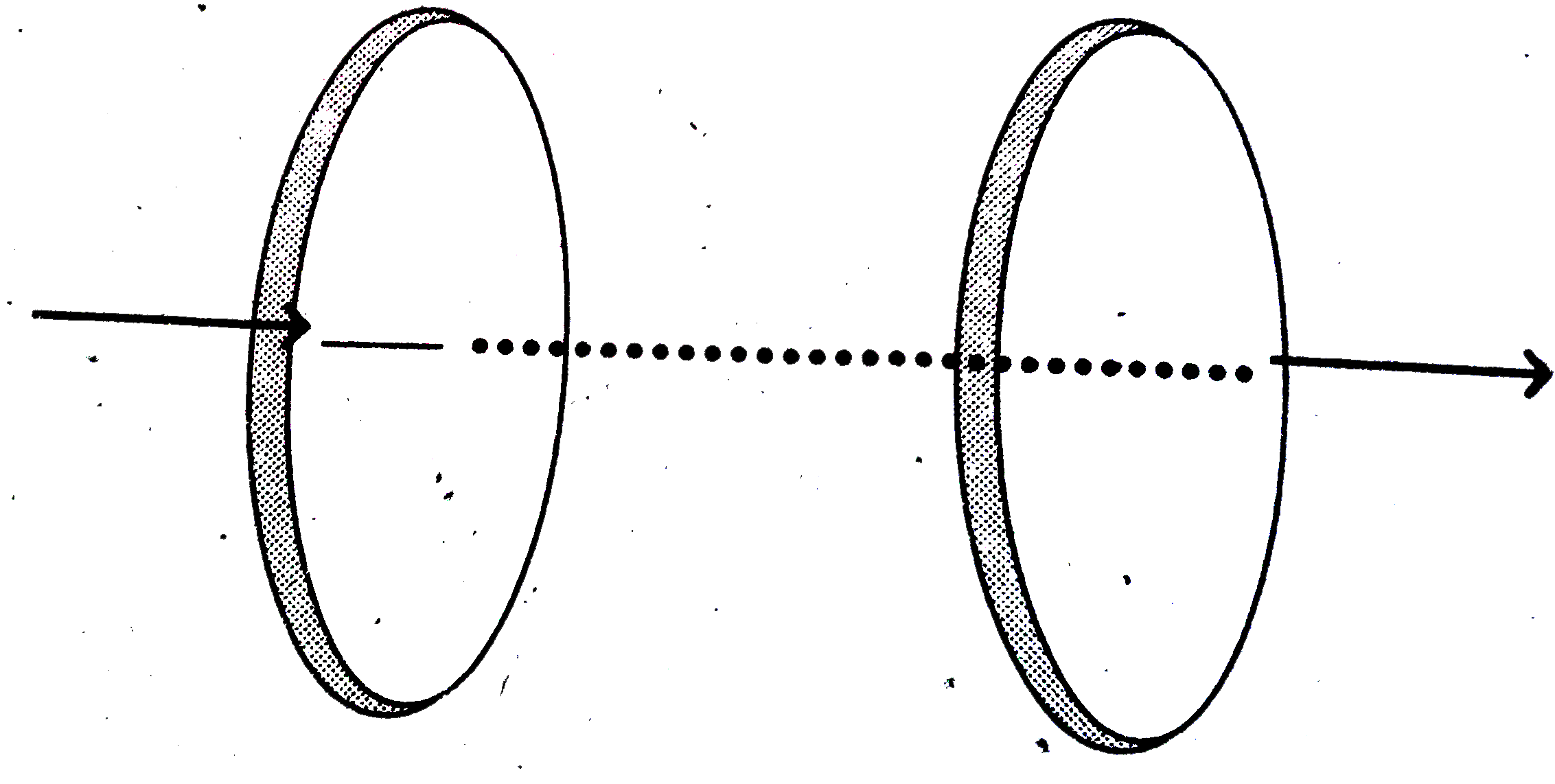Suppose that the electric field part of an electromagnetic wave in vacuum is E={(3.1 N/C) cos [(1.8 rad/m)y+{5.4×106 rad/s} t]} i.
What is the wavelength λ ?Solution in Telugu
Comparing the given question with equation E=E0cos(ky+ωt)
We have , K=1.8 rad/m, ω=5.4×108 rad/s , E0=3.1 N/C
λ=2πk=2×(22/7)1.8=3.492≈3.5m
Topper's Solved these Questions
- ELECTROMAGNETIC WAVEBOOK - VIKRAM PUBLICATION ( ANDHRA PUBLICATION)CHAPTER - ELECTROMAGNETIC WAVEEXERCISE - TEXTUAL EXERCISES
17 Videos
- ELECTROMAGNETIC INDUCTION BOOK - VIKRAM PUBLICATION ( ANDHRA PUBLICATION)CHAPTER - ELECTROMAGNETIC INDUCTION EXERCISE - Additional EXERCISES
15 Videos
- ELECTROSTATIC POTENTIAL AND CAPACITANCEBOOK - VIKRAM PUBLICATION ( ANDHRA PUBLICATION)CHAPTER - ELECTROSTATIC POTENTIAL AND CAPACITANCEEXERCISE - SAQs
4 Videos
Similar Questions
The figure shows a capacitor made of two circular plates each of radius 12 cm, and separated by 5.0 cm . The capacitor is beging charged by an external source (not shown in the figure. ) The charing is constant and equal to 0.15 A

Calculate the capacitance and the rate of charge of potential difference between the plates.
View SolutionSuppose the loop in Textual Exercise 4 is stationary but the current feeding the electromagnet that produces the magnetic field is gradually reduced so that the field decreases from its initial value of 0.3 T at the rate of 0.02Ts−1 .If the cut is joined and the loop has a resistance of 1.6Ω how much power is dissipated by the loop as heat ? What is the source of this power ?
View SolutionWhat is series combination of capacitors. Derive the formula for equivalent capacitance in series combination.
View SolutionThe electric field part of an electromagnetic wave in vacuum is E=3.1(N)/(C)cos[(1.8("rad")/("m"))y+(5.4xx10^(8)("rad")/(s))t]hati The wavelength of this part of electromagnetic wave is
View SolutionSuppose that the electric field part of an electromagnetic wave in vacuum is E={(3.1 N/C) cos [(1.8 rad/m)y+{5.4 xx10^(6) rad/s} t]} i. What is the direction of propagation ?
View SolutionSuppose that the electric field part of an electromagnetic wave in vacuum is E={(3.1 N/C) cos [(1.8 rad/m)y+{5.4×106 rad/s} t]} i.
What is the frequency v ?
View SolutionSuppose that the electric field part of an electromagnetic wave in vacuum is E={(3.1 N/C) cos [(1.8 rad/m)y+{5.4×106 rad/s} t]} i.
What is the amplitude of the magnetic field part of the wave ?
View SolutionSuppose that the electric field part of an electromagnetic wave in vacuum is E={(3.1 N/C) cos [(1.8 rad/m)y+{5.4 xx10^(6) rad/s} t]} i. Write an expression for the magnetic field part of the wave .
View SolutionSuppose that the electric field part of an electromagnetic wave in vacuum is
→E=[(3.1N.C−1)cos{1.8rad.m−1)y+(5.4×106rad.s−1)t}]ˆi
What is the direction of propagation?
View SolutionSuppose that the electric field part of an electromagnetic wave in vacuum is
→E=[(3.1N.C−1)cos{1.8rad.m−1)y+(5.4×106rad.s−1)t}]ˆi
What is the wavelength,λ ?
View SolutionSuppose that the electric field part of an electromagnetic wave in vacuum is vecE=[(3.1 N.C^(-1)) "cos"{1.8 "rad" .m^(-1))y+(5.4xx10^6 "rad". s^(-1) ) t}]hati What is the frequency, f?
View SolutionSuppose that the electric field part of an electromagnetic wave in vacuum is vec(E )={(3.1 N//C)cos [(1.8 rad//m)y+(5.4xx10^(6)rad//s)]}hat(i) What is the direction of propagation ?
View SolutionSuppose that the electric field part of an electromagnetic wave in vacuum is vec(E )={(3.1 N//C)cos [(1.8 rad//m)y+(5.4xx10^(6)rad//s)]}hat(i) What is the wavelength lambda ?
View SolutionSuppose that the electric field part of an electromagnetic wave in vacuum is vec(E )={(3.1 N//C)cos [(1.8 rad//m)y+(5.4xx10^(6)rad//s)]}hat(i) What is the frequency v ?
View SolutionThe electric field part of an electromagnetic wave in vacuum is
E=3.1NCcos[(1.8radm)y+(5.4×108rads)t]ˆi
The wavelength of this part of electromagnetic wave is
View SolutionThe electric field part of an electromagnetic wave in vacuum is E=3.1cos[(1.8 rad/m )y+(5.4×10^8 rad/s )t] i^ . The frequency corresponding to the given part of electromagnetic wave is
View Solution
